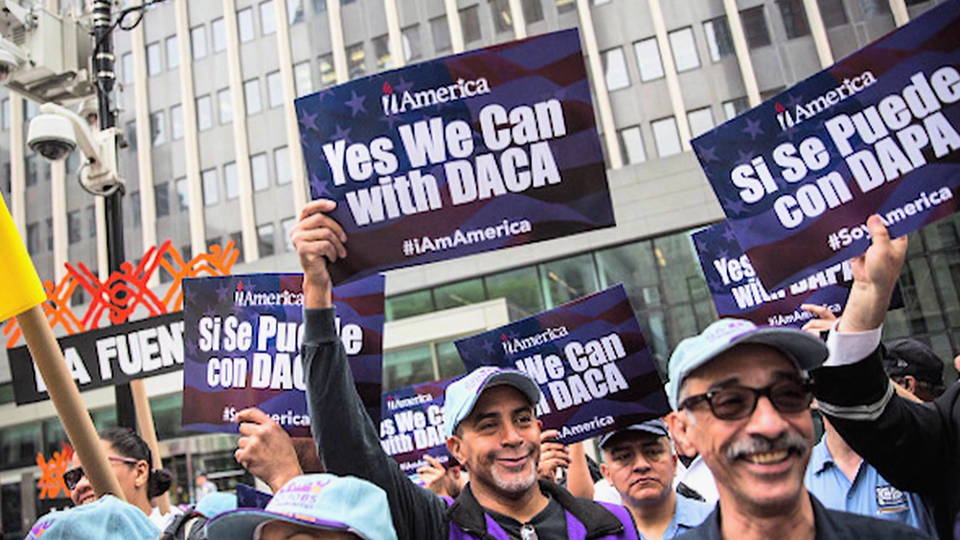The end is near. On March 6, 2018, nearly 1,000 young people daily could begin to lose their protected status as their Deferred Action for Childhood Arrivals program (DACA) work permits begin to elapse (within 2 years).
When President Donald Trump ended this program, he placed the entire burden of resolving the crises for the nearly 1 million people affected directly on the shoulders of Congress
There are several DACA substitution bills whirling around Congress. If Congress can pass a bill before the March 5 deadline, many DACA recipients will be able to continue in the US legally.
Some of the proposed bills have similar requirements as DACA, but a few provide something extra that DACA does not: a pathway to citizenship.
The following are four DACA substitute bills you ought to know about.
1. RAC Act ("Recognizing America's Children Act")
- Presented: In the House on 3/9/2017 by Rep. Carlos Curbelo, R- Florida.
- 36 Co-sponsors: The RAC Act has a great number of sponsors, but 35 are Republican and only one is a Democrat.
- A path to Citizenship: The RAC Act does provide a pathway to citizenship, but only after 10 years of legal residency. Applicants would need to reside in the US for five years as a conditional permanent resident, and then five years as a green card holder in order to be authorized to apply for citizenship.
- Permission to Travel: DACA recipients could travel outside of the US right away., The current DACA requires special permission.
- Basic Requirements: Arrival in the US before 16 years of age and have lived in the US since January 1, 2012. Applicants must either have a high school diploma or be enrolled in school, have a valid work authorization, or enlist in the military.
2. Bridge Act ("Bar Removal of Individuals who Dream and Grow our Economy Act")
- Presented : In the House on 1/12/2017 by Rep. Mike Coffman, R-Colorado.
- 32 Co-sponsors : The Bridge Act does have bipartisan support. 16 Democrats and 16 Republicans have signed on to the support the bill.
- Path to Citizenship : The major problem with this bill is that it does not support a pathway to citizenship. Basically, it is a three-year work visa that requires Congressional approval to renew it for another 3 years.
- Permission to Travel : No travel is permitted outside the US during the three-year visa period.
- Basic Requirements : Are more stringent than the others. Applicants will have entered the US before 16-years of age and must have resided continuously in the US since June 15, 2007. Applicants must be enrolled in school or have a high school degree or GED. Honorably discharged members of the US Armed Forces are also eligible. Applicants must not have committed three or more misdemeanors.
Succeed Act ("Solution for Undocumented Children through Careers, Education, Defending our nation Act")
- Presented : In the Senate on 9/25/2017 by Sen. Thom Tillis (R- North Carolina).
- Co-sponsors : There are only Three. The bill is more expansive than the Republican led Bridge Act introduced in the House.
- Path to Citizenship : After 15 years as both a conditional permanent resident (10 years) and a green card holder (five years), DACA recipients would be able to apply for citizenship.
- Permission to Travel : International travel is allowed under the bill.
- Basic Requirements : Applicants must have entered the US before they reached the age of 16 and be younger than 31 on June 15, 2012. They must have lived continuously in the US since January 1, 2012. Applicants will have earned a high school diploma or GED or be enrolled in higher education. Those who have served or enlisted in the Army are also eligible.
Dream Act ("Development, Relief and Education for Alien Minors Act")
- Presented : The Dream Act has been introduced in both the House and Senate. This bill was originally introduced in 2010, by Sen. Lindsey Graham, R-South Carolina. He reintroduced a reorganized version known as the "Clean Dream Act" in the Senate on 7/20/2017. Rep. Lucille Roybal-Allard, D-California, introduced the same version in the House on 7/26/2017.
- 211 sponsors Co-sponsors : The Dream Act definitely has the most support. The problem remains that only 9 Republicans support this bill.
- Path to Citizenship : The Dream Act provides the quickest path to citizenship.. After five years as a legal permanent resident, applicants can apply for US citizenship.
- Basic Requirements : must have entered the US before the age of 18 and have lived in the US for four years prior to the bill's enactment. Unlike the other bills, there is no date associated with the age requirement. A GED or high school diploma or enrollment in a higher education program is required.

